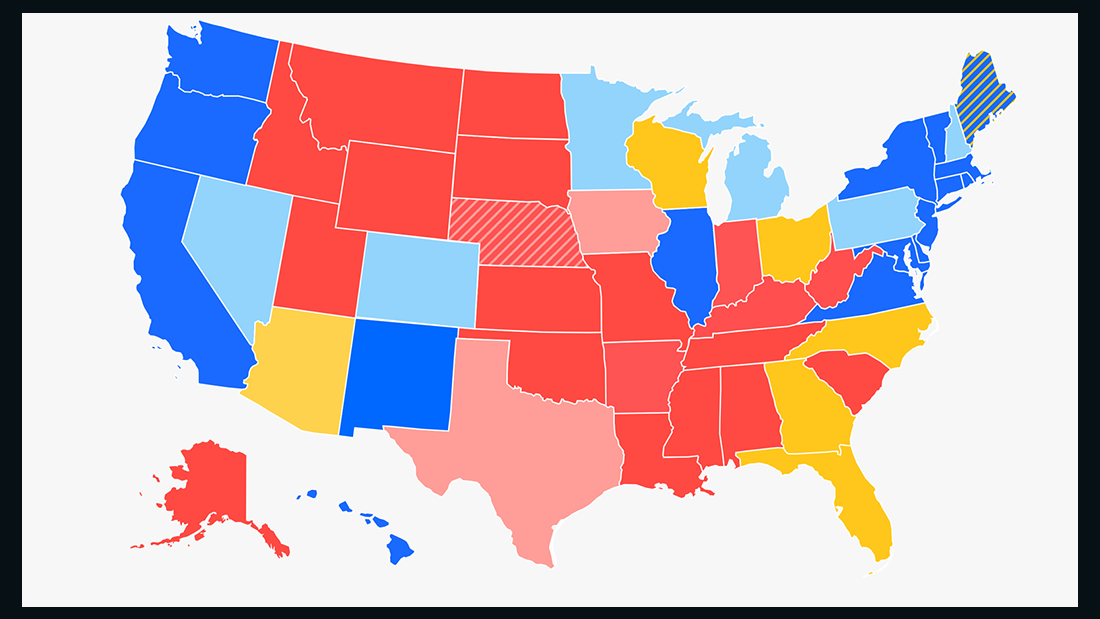
Former Vice President Joe Biden has reserved TV ad time in a whopping 15 states, according to Medium Buying, a Twitter handle that tracks where the campaigns are placing ad-time reservations. Trump has reserved ad spending in 11 states at this point -- all states where Biden is also set to spend money on TV ads. The 11 states where both campaigns have ad reservations are: Arizona, Florida, Iowa, Michigan, Minnesota, Nevada, New Hampshire, North Carolina, Ohio, Pennsylvania and Wisconsin. Biden has also reserved time in Colorado, Georgia, Texas and Virginia.
"The presidential playing field at this point is massive," notes Medium Buying. Agreed!
Now, before we go any further, it's important to note that these are ad reservations, not ad buys. That is a critical difference. Reservations can be shifted or canceled entirely. Money used to reserve ads in one state can be moved to another state if the campaign sees a need. So, ad reservations shouldn't be seen as a set-in-stone indicator of how the two campaigns view the map. Races evolve -- and ad decisions evolve with them.
But ad reservations are, generally speaking, a relatively reliable look at where the two campaigns believe their opportunities and vulnerabilities exist. Campaigns all talk a good game -- remember when Trump was going to make a run at New Mexico? -- but reservations tend to be a more telling indicator of where they think the race stands and where they need to win to get to 270 electoral votes.
That there are 15 states that meet that bar is a remarkable testament to how wide the two sides see the potential playing field -- and how far we have come in the past two decades in terms of what can be considered a swing state. If you think back to the 2000 and 2004 elections, the group of swing states was familiar -- and small. Colorado, Florida, Iowa, New Hampshire, Ohio, Pennsylvania, and maybe one or two others. And that was pretty much it. Both sides were forced to dump tens of millions of dollars into that handful of states, not because they wanted to, but because they couldn't justify spending that money in other states in hopes of turning them.
Barack Obama broke that deadlock in 2008 with wins in Indiana, North Carolina and Virginia, states no Democrat had won at the presidential level in decades. And Trump further widened the swing-state category by notching wins in Michigan, Pennsylvania and Wisconsin, typically Democratic victories, in 2016.
What's clear from the ad reservations for this fall is that the we are now dealing with an even wider playing field. Both campaigns have reserved time in Arizona, a state long safely in the Republican column. Ditto Minnesota, a state a Republican presidential candidate hasn't won since 1972(!).
Viewed broadly, the size of the playing field -- and the states included in it -- suggest that Biden is a) playing more offense than defense and b) sees a massive Electoral College victory as a genuine possibility.
Of the 15 states were Biden has laid down reservations, 10 were carried by Trump in 2016, while five -- Colorado, Minnesota, New Hampshire, Nevada and Virginia -- were won by Hillary Clinton. Trump's reservations have a similar split; 8 are states he won in 2016, and 3 Clinton carried.
Those data points are generally consistent with the shape of the race, with Biden ahead nationally and in most swing states, and Trump trying to keep the coalition that elected him in 2016 together.
The most fascinating part of the ad reservation is that Biden has blocked out time in Texas and Georgia, two major electoral vote treasure troves, and two states that haven't been won by a Democratic running for president since 1976 and 1992, respectively. Polling in both states shows the race close; Trump has a 3.5 point lead in the Real Clear Politics polling average in Texas and a 1.1 point average margin in Georgia.
If Biden were to win one or both of Texas and Georgia, he would have at least the possibility of a major -- 350-plus electoral votes -- Electoral College landslide. (House Speaker Nancy Pelosi has said for the better part of the last two years that Democrats must win "big" in order to avoid Trump aggressively contesting the result and refusing to concede.)
But it's more than just Electoral College calculus at work here. If Biden goes through with his plans to spend on ads in Texas and Georgia -- which is a big "if" given how expensive statewide TV buys are in both states -- he would likely force Trump's campaign to spend (and spend heavily) in those states, too. And every dollar Trump spends defending Texas or Georgia (or both) is a dollar he can't play offense with in Minnesota or Nevada or Virginia.
The widening of the electoral playing field has been happening gradually over the past three elections. But for 15 states to be in the mix this late in a presidential election cycle -- including Electoral College monsters like Texas and Georgia -- is a new chapter in modern American politics. And one that holds all sorts of possibilities -- for both parties -- in future races.
"time" - Google News
August 31, 2020 at 10:37PM
https://ift.tt/3jt1f83
This is the widest presidential battleground in a very long time - CNN
"time" - Google News
https://ift.tt/3f5iuuC
Shoes Man Tutorial
Pos News Update
Meme Update
Korean Entertainment News
Japan News Update
Bagikan Berita Ini














0 Response to "This is the widest presidential battleground in a very long time - CNN"
Post a Comment